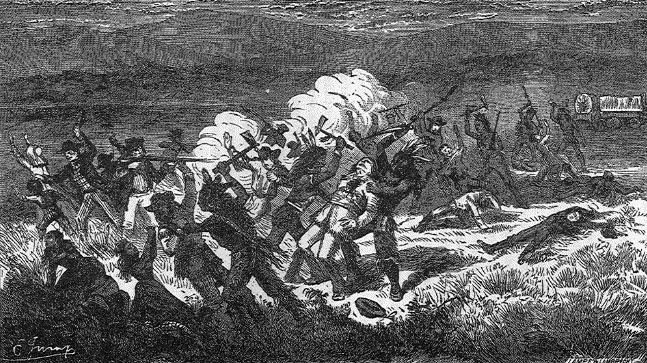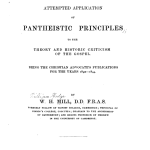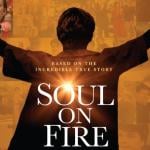
(Wikimedia Commons public domain)
Last week, I published a column in the Deseret News that included this paragraph:
For some, in a sense, the most effective answer to questions about early Mormon plural marriage might be information about Arabian Nahom and Lehi’s trail. The most reassuring response to the Mountain Meadows Massacre could be the Book of Mormon witnesses. And evidence of the Book of Mormon’s roots in the ancient Middle East may, in certain cases, offer the most convincing defense of the LDS Church’s stance on same-sex marriage.
Those three sentences have drawn considerable comment in certain circles, some of it quite hostile.
I would like to “unpack” them a bit, as philosophy professors are sometimes wont to say. My weekly Thursday columns, which I’ve been writing for very nearly seven years now, are invariably between 736 and 739 words long, and they seldom afford the opportunity to say everything, even on a sharply delimited subject, that I would like to say. (I’m often amused by letters to the editor, and comments on message boards, and emails sent to me personally — specimens of the latter two categories are sometimes considerably longer than my actual columns — listing the topics and issues that I should have addressed in my little essays but failed to mention.)
Anyway, I’ve appreciated the suggestions from some helpful critics that the paragraph above reveals me to be stupid, insane, brazenly dishonest, recommending shameless diversionary tactics, acknowledging that we really have no real arguments for any of those things, justifying mass murder, or some combination of the foregoing. I think I may have omitted a few other suggested explanations from critics, but — trust me — all of them were damning. Now, these were no doubt good faith efforts. Unfortunately, though, they’re all quite wrong.
The paragraph was an expansion of a comment made to me by my friend Scott Gordon, the president of FairMormon, a few weeks ago. Here is what it means:
Early Mormon plural marriage is a difficult subject for many believing Latter-day Saints. Leering, cynical explanations for Joseph Smith’s initiation of polygamy are very easy to come up with; we’ve seen too many sexual predators among powerful, high-status males (in religion, business, politics, the military, etc.) not to think almost immediately of such explanations. And, while good, faithful LDS scholarship is beginning to appear on the topic — I think immediately of Brian Hales, Ugo Perego, and Craig Foster (e.g., here and here and here) — the best that such scholarship can hope to do, from the perspective of maintaining grounds for faith, is to neutralize plural marriage as a threat to belief. That is, for most people in most cases, Mormon polygamy is never going to become affirmative grounds for a testimony.
A comparison to the game of American football might illustrate how I’m thinking here:
Points in football are typically scored when a team’s offensive squad are on the field. But not always. Sometimes, following an interception or a fumble, a defensive player will score a touchdown. But no football coach would ever want to play a game in which his team always had to play defense. He would usually, if not always, lose. With plural marriage, though, I think it’s entirely a game where the Mormon defensive squad is always on the field. The best and most realistic hope, under such conditions, would be to play to a tie.
But there are other ways in which the issue can be approached.
Suppose that you hear a really negative report about a man named Bob. It seems to suggest bad behavior on his part, perhaps unethical, perhaps unkind, perhaps even illegal.
Now, consider three different scenarios.
In the first, you know nothing about Bob except this negative report. In other words, the negative report constitutes the totality of what you know, or think you know, about him.
You will probably be inclined, in this first scenario, to think very poorly of him. You have no particular reason not to do so.
In the second scenario, you dislike Bob. You already hold a low opinion of him. The new negative report is completely consistent with your prior judgment of him and only goes to strengthen and confirm that you were right about his character.
In the third scenario, you’ve known, liked, and respected Bob for much of your life. You hold him to be a man of exemplary kindness and integrity. This new negative report clashes dramatically with your picture of the man you know.
You will probably be inclined, according to this third scenario, to withhold your judgment, at least for a while. You’ll want to hear his side of the story. You’ll resist granting the truth of the negative report. You’ll be thinking of ways in which it might be false, or at least not the whole truth. Perhaps Bob didn’t really do what’s reported of him. Perhaps he had very good reasons for doing it. Context counts. Or perhaps elements of the story have been distorted. You’ll give him the benefit of the doubt.
In other words, prior notions about a person or an issue affect how new information (or new claimed information) is received.
This is the situation, I think, with Joseph Smith and plural marriage. (It’s why I’ve strongly recommended books like Mark McConkie’s wonderful collection Remembering Joseph, with its many positive accounts of his personality and character from people who knew him.) If one’s evaluation of Joseph is firmly positive, new negative reports will have less capacity to create a negative image. By its very nature, the origins of plural marriage will always be obscure and debatable.
Now, I’m not suggesting that negative reports should be resisted forever. Perhaps your friend Bob has an unexpected dark side. Perhaps he was never really the man he seemed to be at all. My conviction, though, based upon years of reading him and reading about him, is that Joseph, though not perfect, was a very good man who will ultimately weather whatever storm swirls about him. But that’s a judgment, like every personal judgment, that individuals make, and must make, individually. I like Bob. Frank doesn’t. That’s life in this world.
So back to the comment from my column that Nahom and Lehi’s Arabian trail might be the best answers, for some, to questions about early Mormon polygamy. What did I mean? I meant this:
Arguments suggesting the accuracy of 1 Nephi’s account of Arabian geography — as they appear in the work of such people as S. Kent Brown and Warren Aston and others — can strengthen one’s confidence in Joseph Smith’s prophethood. And a person fortified by such confidence can respond to the issue of early Mormon polygamy by reasoning that, while the evidence is murky and sometimes even troubling, she is convinced that he was a prophet and is content, therefore, to await what she believes will be the eventual positive resolution of her questions on the origins of plural marriage in Kirtland and Nauvoo. If Joseph was, as he seems on other grounds to have been, a good and sincere man, when the evidence is fully in and clearly understood, he will be vindicated.
This is, plainly, a position of faith. But it’s not an irrational or unreasonable position to take when confronted with a question for which insufficient evidence exists to definitively resolve it. In fact, we show such faith — or trust, or confidence — in many interpersonal relationships. Many of us do it just about every day. We loan books or money or cars to others, based on our confidence in the judgment we’ve formed of them based upon past experience.
My reasoning on the other two sentences of the paragraph in question is similar:
How could the witnesses to the Book of Mormon be a reassuring response to questions about the Mountain Meadows Massacre? First of all, I’m not defending the Mountain Meadows Massacre, as at least a couple of critics have alleged. It was a crime. It’s a blot on the history the Church and on the history of Utah. It should not have happened. I say nothing in favor of it. Nor, second, am I counseling defenders to simply, brazenly, try to change the subject. Nor, third, am I admitting that we have no good answers to questions and worries on the topic. I happen to believe that the 2011 Oxford University Press book Massacre at Mountain Meadows, by the Latter-day Saint historians Ronald W. Walker, Richard E. Turley, and Glen M. Leonard, is very good indeed. I continue to look forward to the promised follow-up volume from the same project, and, while there are a number of terrible books on the topic and while her books could use some updating now, I also think highly of the work of the late Mormon historian Juanita Brooks (for example, this and this).
But, again, the Mountain Meadows Massacre will never be exactly faith-promoting. The Church will likely never build a visitors center at the site of the crime. So, what if, despite the work of Brooks and Walker and Turley and Leonard (and others such as Leonard Arrington and Davis Bitton), someone continues to find the Mountain Meadows Massacre troubling to his or her faith?
I believe that getting back to the basics can be helpful here. And I think that the witnesses to the Book of Mormon are about as basic as it gets. That’s why I keep recommending the works, on this topic, of Richard Lloyd Anderson and others.
And what about my claim that the most convincing defense of the LDS Church’s stance on same-sex marriage might rest, for some, in evidence of the Book of Mormon’s roots in the ancient Middle East?
The same sort of reasoning undergirds my assertion here.
I think that the Princeton legal and political philosopher Robert George and the admirable Dante translator Anthony Esolen and others have already laid out a strong case against redefining marriage to include same-sex couples. But if the issue still troubles you, if you aren’t convinced by such arguments, that needn’t take you out of the Church. We were never promised that revelation or inspiration would always coincide with our best native judgment nor that it would always seem entirely reasonable. Revelation would be quite redundant if it always accorded perfectly with what we would have thought anyway. Ask Abraham in the matter of Isaac. Or Jonah on the question of preaching in Nineveh. Or Wilford Woodruff when he was told to leave his successful missionary efforts in the Staffordshire Potteries. (Similar examples could be multiplied indefinitely. I have some personal ones.)
You might still be reassured, re-anchored, by revisiting some of the arguments once published by the old Foundation for Ancient Research and Mormon Studies (FARMS) and, for a while, by its successor organization, the Neal A. Maxwell Institute for Religious Scholarship, and that are now to be found most easily and accessibly at Book of Mormon Central and that continue to be developed at the Interpreter Foundation.
And that is what I meant, more or less.
I hope that my explanation here will help some of those who were sincerely puzzled. The hardcore critics aren’t interested in understanding; this won’t help them a bit.
Posted from Richmond, Virginia










